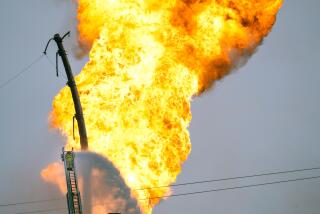U.S. Official Discusses Law in Lawless Capital
BAGHDAD â U.S. Atty. Gen. Alberto R. Gonzales arrived Tuesday to discuss the rule of law, as the law of the street left its mark in the capital: 21 bodies bearing signs of torture.
Authorities said 36 other people died after a pipeline exploded as residents were siphoning fuel from it in Diwaniya, where a battle between Shiite militiamen and government forces the previous day killed at least 81 people, according to revised figures.
Elsewhere in Iraq, 27 people were killed or found dead Tuesday, including an American soldier felled by a roadside bomb in the capital.
Early today, 12 Iraqi army recruits were killed in Hilla, south of the capital. Police Capt. Ahmed Muthanna said more than two dozen other prospective soldiers were wounded in the bombing at a recruitment center.
Flying into the capitalâs heavily guarded Green Zone, Gonzales discussed detainee issues and interrogation tactics with top Iraqi security officials.
Afterward, Gonzales told reporters he had talked about the use of âextraordinary measuresâ in the handling of detainees, but added that the Iraqis would have to decide for themselves what would be permissible.
âItâs difficult to decide what is appropriate and what is allowed under law,â Gonzales said.
In a series of memos, Gonzales helped draft the U.S. administrationâs torture and detention policies that critics charge contributed to abuses of prisoners held by the U.S. military in Cuba and Iraq. He dismissed Geneva Convention protections for prisoners detained in Afghanistan. Last year, he also acknowledged taking part in a meeting that discussed the legality of interrogation techniques that included the threat of live burial and simulating the sensation of drowning.
Taking questions from reporters during a brief meeting in the courthouse where former President Saddam Hussein is standing trial, Gonzales said that âthe U.S. does not engage in torture.â
He also said he had discussed rule-of-law issues with Iraqi officials and reiterated American support for the Iraqi judicial system.
In Iraq, torture and extrajudicial killings by militias and Shiite-dominated security forces have become a widespread problem that exacerbates the sectarian conflict.
All of the dead discovered Tuesday in various neighborhoods throughout the capital had been handcuffed and tortured before being shot execution-style. But it was unclear whether the victims were Sunni or Shiite.
Iraqi security forces on Tuesday assumed control of Diwaniya, where a battle between Shiite militia fighters and government forces raised doubts about the Iraqi armyâs ability to assume control of the streets.
Iraqi security forces killed 50 gunmen, but lost 23 soldiers, several of whom were executed when they ran out of ammunition. Officials in Diwaniya said that eight civilians also died during the battle.
Diwaniya, about 100 miles south of the capital, is a Shiite-dominated city and increasingly a stronghold for radical cleric Muqtada Sadr, who once clashed with U.S. troops in Najaf and is among Iraqâs most powerful figures.
Tragedy in the southern city was compounded Tuesday when an explosion tore through a pipeline where Iraqis were siphoning fuel, killing at least 36 people, local officials reported.
The fire was still burning as rescue workers and locals tried to evacuate the wounded. Witnesses said the death toll was certain to climb, and described victims trapped in large pools of burning fuel. Health officials reported 30 to 40 people missing after the blast.
âI heard a big explosion and saw a huge fireball that rose 50 meters into the sky,â said Mohammed Zaydi, 35.
The deputy governor of the province said the explosion was caused by fighting among pipeline guards and those siphoning the fuel.
Another official said the pipeline had been left unguarded by Iraqi soldiers deployed to fight the militias.
U.S. military officials believe that Sadrâs militia is behind much of the violence in the capital, where a massive U.S. military operation has held down the number of killings this month. But neither the U.S. military nor the Iraqi government has been able to curb his power across the south.
The provincial governor, Khalil Jalil Hamza, and local council members met Sadr in Najaf on Monday, reaching an agreement to stop the fighting.
âWe exerted good efforts to stop the bloodletting and thank God we were able to stop it,â Hamza told the TV channel Al Iraqiya.
*
Times staff writers Saif Hameed and Raheem Salman contributed to this report.
More to Read
Get the L.A. Times Politics newsletter
Deeply reported insights into legislation, politics and policy from Sacramento, Washington and beyond. In your inbox three times per week.
You may occasionally receive promotional content from the Los Angeles Times.










